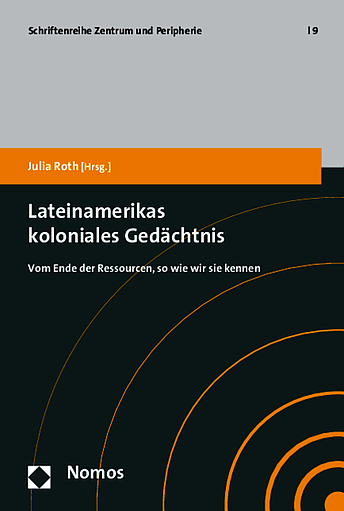englischThe volume “Latin America’s Colonial Memory” illuminates historic and current inequalities in Latin America related to the wealth in natural resources and the structural dependence on their export from manifold perspectives. Current economic, social and cultural conflicts are discussed against the backdrop of a long history of exploitation under unequal conditions. Besides experts on resource extractivism (Mirta Antonelli, Maristella Svampa), the volume includes reflections on social movements and alternative cosmo-visions forming in the context of such conflicts (Raúl Zibechi), also from activist perspectives (Chacho Liempe, Gabriela Romano, Gipi Fernández). Moreover, the volume counts on artistic approaches (Eduardo Molinari) and theoretical reflections (Fernando Coronil, Luis Tapia) on the situation of the left and the lack of new visions of the future on the political level or the paradox between state institutions and alternative concepts like the Buen Vivir. A third section of texts embeds the topic of wealth of natural resources and dependence on resource export into a broader frame of historically grown and entangled inequalities in terms economic aspects, but also with respect to asymmetrical circulations of knowledge and discuss possible solutions in order to overcome them (Elmar Altvater, Ana Esther Ceceña).
With conributions by:
Mirta A. Antonelli, Elmar Altvater, Ana Esther Ceceña, Fernando Coronil, Juan Carlos, Gipi Fernández, Chacho Liempe, Eduardo Molinari, Gabriela Romano, Julia Roth, Maristella Svampa, Luis Tapia, Raúl Zibechi
“Lateinamerikas koloniales Gedächtnis“ beleuchtet historische und gegenwärtige Ungleichheiten in Lateinamerika, die in Zusammenhang mit dem Reichtum an natürlichen Rohstoffen und strukturellen Abhängigkeiten vom Rohstoffexport stehen. Gegenwärtige ökonomische, soziale und kulturelle Konflikte werden vor dem Hintergrund einer langen Geschichte der Ausbeutung aus vielfältigen Perspektiven diskutiert. Neben Expert/innen zum Thema Rohstoffextraktivismus (Mirta Antonelli, Maristella Svampa), zählen dazu Reflektionen in Bezug auf soziale Bewegungen und alternative Kosmovisionen, die sich im Kontext dieser Konflikte formieren (Raúl Zibechi) - auch aus aktivistischer Perspektive (Chacho Liempe, Gabriela Romano, Gipi Fernández). Darüber hinaus umfasst der Band künstlerische Zugänge (Eduardo Molinari) sowie theoretische Reflektionen zur Situation der Linken in Lateinamerika (Fernando Coronil) oder zu aktuellen alternativen Konzepten wie dem Buen Vivir (Luis Tapia). Eine dritte Sektion von Texten bettet das Thema Rohstoffreichtum und Ressourcenabhängigkeit in einen breiteren Rahmen historisch gewachsener und verflochtener globaler Ungleichheiten in ökonomischer Hinsicht, aber auch in Bezug auf asymmetrische Wissenszirkulation ein und diskutiert mögliche Lösungsansätze für deren Überwindung (Elmar Altvater, Ana Esther Ceceña).
Mit Beiträgen von:
Mirta A. Antonelli, Elmar Altvater, Ana Esther Ceceña, Fernando Coronil, Juan Carlos, Gipi Fernández, Chacho Liempe, Eduardo Molinari, Gabriela Romano, Julia Roth, Maristella Svampa, Luis Tapia, Raúl Zibechi
TEXT ANZEIGE WELTTRENDS MÄRZ 2015
Der Band beleuchtet historische und gegenwärtige Ungleichheiten in Lateinamerika, die in Zusammenhang mit dem Reichtum an natürlichen Rohstoffen und strukturellen Abhängigkeiten vom Rohstoffexport stehen. Gegenwärtige ökonomische, soziale und kulturelle Konflikte werden vor dem Hintergrund einer langen Geschichte der Ausbeutung aus vielfältigen Perspektiven diskutiert.
Behandelt werden Thema Rohstoffextraktivismus, Reflektionen in Bezug auf soziale Bewegungen und alternative Kosmovisionen. Darüber hinaus umfasst der Band künstlerische Zugänge sowie theoretische Reflektionen zur Situation der Linken in Lateinamerika oder zu aktuellen alternativen Konzepten wie dem Buen Vivir. Eine dritte Sektion von Texten bettet das Thema Rohstoffreichtum und Ressourcenabhängigkeit in einen breiteren Rahmen globaler Ungleichheiten in ökonomischer Hinsicht ein und diskutiert mögliche Lösungsansätze für deren Überwindung.



